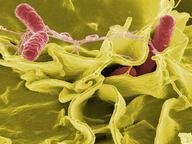Quiz Answer Key and Fun Facts
1. As bacteria develop new resistances, their names get longer as well, like "methycillin resistant staphylococcus aureus". Phew, no wonder scientists prefer to use abbreviations such as "MRSA". Which of the following is NOT an abbreviation related to antibiotic resistant bacteria?
2. What is causing the development of antibiotic resistant bacteria?
3. "Superbugs" are more infectious than non-drug resistant bacteria.
4. Methicillin resistant Staphylococcus aureus can be transmitted to pets.
5. Penicillin was first mass produced in 1944. When was the first penicillin resistant microorganism found?
6. Alexander Fleming is commonly credited with the discovery of penicillin. Did he suspect that bacteria could become resistant?
7. Acinetobacter baumannii is a respiratory bacillus that is usually found in hospitals, often in intensive care units. In recent years it has caused illness and even deaths among troops in the Middle East. Drinking alcohol kills the bacteria and helps people to recover more quickly.
8. In the US, 50-60% of infections people get while in hospital are caused by antibiotic resistant bacteria. What is the term for an infection acquired during a hospital stay?
9. In the Soviet Union the treatment of infections without antibiotic was widespread. It is still used in Eastern Europe and studied by scientists all over the world. What does it use?
10. What is the best protection against infection by a superbug?
Source: Author
Catamount
This quiz was reviewed by FunTrivia editor
crisw before going online.
Any errors found in FunTrivia content are routinely corrected through our feedback system.

